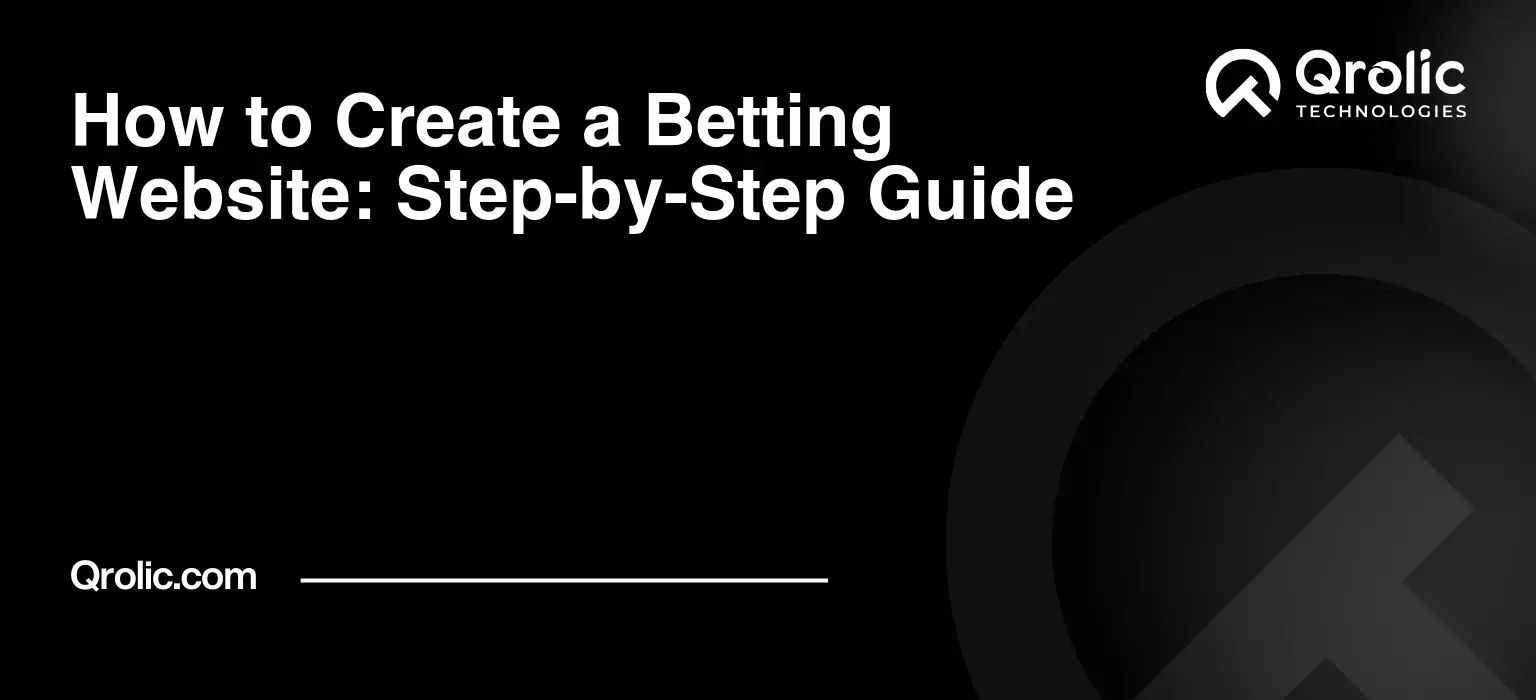Quick Summary:
- Prioritize legal licensing and thorough business planning.
- Choose the right platform, focusing on security and user experience.
- Attract users through strong marketing and excellent support.
- Continuously update your site and promote responsible gambling.
Table of Contents
- Understanding the Betting Landscape: Is This the Right Bet for You?
- Phase 1: Planning and Legal Foundations
- Phase 2: Technical Development and Platform Selection
- Phase 3: Testing, Launch, and Marketing
- Phase 4: Ongoing Maintenance and Improvement
- Qrolic Technologies: Your Partner in Betting Website Development
- Conclusion: Placing Your Bet on Success
Understanding the Betting Landscape: Is This the Right Bet for You?

Before diving headfirst into the complex world of betting website creation, it’s crucial to understand what you’re getting into. The online sports betting industry is booming, but it’s also highly regulated and fiercely competitive. Why do you want to build a betting website? Is it a passion project, a business opportunity, or both? Understanding your motivation will inform your strategy every step of the way.
What Makes a Successful Betting Website?
A successful betting website isn’t just about taking bets. It’s about creating an engaging, trustworthy, and user-friendly platform that keeps players coming back. It requires a keen understanding of:
- The Target Audience: Who are you trying to attract? Are you focusing on casual bettors, seasoned professionals, or a specific niche (e.g., esports, horse racing)?
- User Experience (UX): Is your website easy to navigate? Can users quickly find the sports, events, and odds they’re looking for? A clunky website will drive users away faster than you can say “bad beat.”
- Security and Trust: Are you providing a secure environment where users feel comfortable depositing and withdrawing funds? This is paramount for building trust and longevity.
- Competitive Odds: How do your odds compare to other betting sites? Offering competitive odds is essential for attracting and retaining bettors.
- Marketing and Promotion: How will you attract users to your website? What marketing strategies will you employ to stand out from the crowd?
- Customer Support: Are you providing responsive and helpful customer support to address user issues and concerns?
The “Why” Behind Building a Betting Website: Identifying Your Niche
Why are you creating this website? This isn’t a rhetorical question; it’s the foundation upon which your entire project will be built. Consider these possibilities:
- Niche Sports Focus: Instead of trying to compete with the giants on mainstream sports, focus on a niche area like eSports, college lacrosse, or international table tennis. This allows you to build expertise and attract a dedicated following.
- Innovative Betting Features: Can you offer unique betting options or features that other websites don’t? Examples include enhanced odds, early cash-out options, or social betting features.
- Community Focus: Create a betting website that emphasizes community and interaction, such as forums, tipster competitions, or expert analysis.
- Mobile-First Approach: Design your website with mobile users in mind from the outset, ensuring a seamless and responsive experience on smartphones and tablets.
When is the Right Time to Launch?
Launching your betting website during a major sporting event (like the Super Bowl, the World Cup, or the Olympics) can provide a significant boost in traffic and user acquisition. However, it’s also essential to ensure that your website is fully functional and prepared to handle the increased demand. Pre-launch testing is critical.
Phase 1: Planning and Legal Foundations
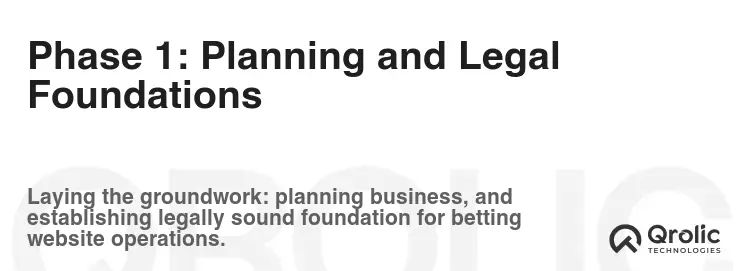
1. Market Research: Know Your Opponent
- Identify Your Target Market: Define your ideal customer profile. Consider demographics, betting preferences, income levels, and technology usage.
- Analyze Competitors: Identify your main competitors and analyze their strengths and weaknesses. What are they doing well? Where are they falling short?
- Identify Market Trends: Stay up-to-date on the latest trends in the online betting industry, such as the growth of mobile betting, the increasing popularity of eSports, and the emergence of new betting technologies.
- Keyword Research: Use tools like Google Keyword Planner, Ahrefs, or SEMrush to identify relevant keywords that your target audience is searching for. Examples include: “online sports betting,” “best betting sites,” “how to bet on sports,” “[sport] betting odds,” “[sport] betting tips.” Incorporate these keywords naturally into your website content and meta descriptions.
2. Legal and Licensing: No Skirting the Rules
This is arguably the most crucial step. Operating a betting website without the proper licenses is illegal and can result in hefty fines, legal action, and even imprisonment.
- Identify the Target Jurisdiction(s): Where will your betting website be accessible? Regulations vary significantly from country to country and even from state to state within countries like the United States.
- Research Licensing Requirements: Determine the specific licensing requirements for each jurisdiction you plan to operate in. Common licensing jurisdictions include Malta, the United Kingdom, Gibraltar, Curacao, and the Isle of Man.
- Consult with Legal Professionals: Engage with experienced legal professionals who specialize in online gambling law. They can guide you through the licensing process and ensure that you comply with all applicable regulations.
- Understand Compliance Obligations: Be aware of ongoing compliance obligations, such as anti-money laundering (AML) regulations, responsible gambling measures, and data protection laws (e.g., GDPR).
3. Business Plan: Charting a Course to Profitability
A well-defined business plan is essential for securing funding and guiding your business decisions.
- Executive Summary: A concise overview of your business, including your mission, vision, and key objectives.
- Company Description: A detailed description of your business, including your legal structure, ownership, and management team.
- Market Analysis: A comprehensive analysis of your target market, including market size, growth potential, and competitive landscape.
- Products and Services: A detailed description of the betting products and services you will offer, including the sports, events, and betting options available.
- Marketing and Sales Strategy: A detailed plan for how you will attract and retain customers, including your marketing channels, promotional activities, and sales tactics.
- Management Team: Information about the key personnel involved in running the business, highlighting their experience and expertise.
- Financial Projections: Realistic financial projections, including revenue forecasts, expense budgets, and profitability analysis. This is crucial for attracting investors.
- Funding Request: If you are seeking external funding, clearly state the amount of funding you require and how you plan to use it.
Phase 2: Technical Development and Platform Selection

4. Platform Selection: The Heart of Your Operation
Choosing the right platform is critical for the success of your betting website. You have several options:
-
Turnkey Solutions: These are pre-built platforms that include all the essential features for running a betting website, such as account management, payment processing, odds feeds, and risk management tools. Examples include:
- Pros: Quick and easy setup, lower initial investment.
- Cons: Limited customization options, higher long-term costs (revenue sharing or ongoing fees).
- When to Choose: If you need to launch quickly and have a limited budget.
-
White Label Solutions: Similar to turnkey solutions, but offer more customization options. You can brand the platform with your own logo and design.
- Pros: Faster setup than custom development, more customization than turnkey solutions.
- Cons: Still limited customization, reliance on the provider for updates and maintenance.
- When to Choose: If you want more control over branding and design but don’t have the resources for custom development.
-
Custom Development: Building your own platform from scratch.
- Pros: Complete control over design and functionality, unique features and differentiation.
- Cons: High initial investment, long development time, requires a skilled development team.
- When to Choose: If you have a complex business model, require highly customized features, and have a significant budget.
Key Features to Look for in a Betting Platform:
- Scalability: The platform should be able to handle a large number of users and transactions without performance issues.
- Security: Robust security measures to protect user data and prevent fraud.
- Reliability: High uptime and minimal downtime to ensure a seamless user experience.
- Integration with Odds Feeds: Seamless integration with reliable odds providers.
- Payment Gateway Integration: Support for multiple payment methods, including credit cards, e-wallets, and cryptocurrencies.
- Reporting and Analytics: Comprehensive reporting and analytics tools to track key metrics and identify areas for improvement.
- Mobile Compatibility: A responsive design that works seamlessly on all devices.
5. Sports Betting Design and User Interface (UI): Betting Website Design
Your website’s design is crucial for attracting and retaining users. It needs to be visually appealing, easy to navigate, and optimized for conversion. Sports betting design should:
- Professional Look and Feel: Invest in a high-quality design that conveys professionalism and trustworthiness.
- Intuitive Navigation: Make it easy for users to find the sports, events, and betting options they’re looking for. Use clear and concise navigation menus.
- Mobile-First Design: Prioritize mobile users by designing your website with a mobile-first approach.
- Fast Loading Speeds: Optimize your website for speed to ensure a smooth and responsive user experience. slow loading speeds can lead to user frustration and abandonment.
- Clear Call to Actions (CTAs): Use clear and compelling CTAs to guide users towards desired actions, such as placing a bet or making a deposit.
- Visually Appealing Graphics: Use high-quality images and graphics to enhance the visual appeal of your website.
6. Integrating Odds Feeds: The Fuel for Your Engine
Reliable and accurate odds feeds are essential for offering competitive betting options.
- Choose a Reputable Provider: Select a reputable odds feed provider with a proven track record of accuracy and reliability.
- Consider Coverage: Ensure that the provider offers coverage of the sports and events you want to offer on your website.
- Integration Options: Understand the integration options offered by the provider and ensure that they are compatible with your platform.
- Real-Time Updates: Choose a provider that offers real-time odds updates to ensure that your users have access to the most up-to-date information.
7. Payment Gateway Integration: Making Transactions Seamless
Secure and reliable payment processing is crucial for building trust and facilitating transactions.
- Choose a Secure Payment Gateway: Select a reputable payment gateway that uses encryption and other security measures to protect user data.
- Support Multiple Payment Methods: Offer a variety of payment methods to cater to the preferences of your users, including credit cards, e-wallets, and cryptocurrencies.
- Ensure PCI Compliance: Ensure that your payment gateway is PCI compliant to protect cardholder data.
- Implement Fraud Prevention Measures: Implement fraud prevention measures to protect your business from fraudulent transactions.
8. Security Measures: Fortifying Your Fortress
Security is paramount in the online gambling industry. You need to protect user data, prevent fraud, and ensure the integrity of your platform.
- SSL Encryption: Use SSL encryption to protect data transmitted between your website and your users.
- Firewalls: Implement firewalls to prevent unauthorized access to your servers.
- Intrusion Detection Systems (IDS): Use IDS to detect and prevent intrusions into your network.
- Regular Security Audits: Conduct regular security audits to identify and address vulnerabilities.
- Data Backup and Recovery: Implement a robust data backup and recovery plan to protect against data loss.
- Two-Factor Authentication (2FA): Implement 2FA to add an extra layer of security to user accounts.
Phase 3: Testing, Launch, and Marketing
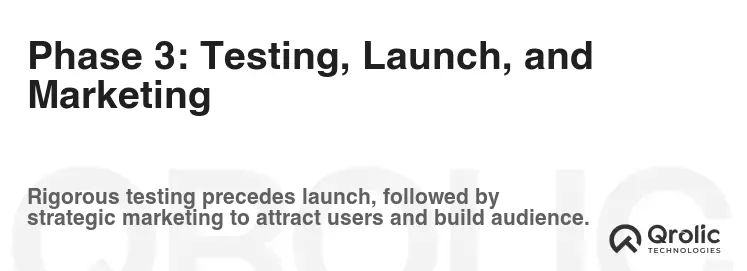
9. Testing: Kicking the Tires Before the Big Race
Thorough testing is essential to ensure that your website is functioning correctly and providing a seamless user experience.
- Functional Testing: Test all website functionality, including account registration, login, betting, payment processing, and customer support.
- Usability Testing: Conduct usability testing to identify any areas where the user experience can be improved.
- Performance Testing: Test the website’s performance under different load conditions to ensure that it can handle a large number of users and transactions.
- Security Testing: Conduct security testing to identify and address any vulnerabilities.
- Cross-Browser and Cross-Device Testing: Test the website on different browsers and devices to ensure that it is compatible with all platforms.
10. Launching Your Website: The Green Light is On!
Once you’ve completed testing and are satisfied with the results, it’s time to launch your website.
- Pre-Launch Marketing: Build anticipation for your launch through pre-launch marketing activities, such as social media campaigns, email marketing, and public relations.
- Monitor Performance: Closely monitor website performance during the initial launch period to identify and address any issues that may arise.
- Gather User Feedback: Solicit user feedback to identify areas for improvement.
- Be Prepared for High Traffic: Ensure that your servers are prepared to handle a surge in traffic during the launch period.
11. Marketing and Promotion: Spreading the Word
Marketing is essential for attracting users to your website and building a loyal customer base.
- Search Engine Optimization (SEO): Optimize your website for search engines to improve your rankings in search results. Focus on relevant keywords, high-quality content, and link building. Keywords like: “online betting platform development,” “sports betting software solutions,” “custom betting website development.”
- Social Media Marketing: Use social media to connect with your target audience, promote your website, and build brand awareness.
- Email Marketing: Build an email list and use email marketing to communicate with your users, promote special offers, and provide updates about your website.
- Affiliate Marketing: Partner with affiliates to promote your website to their audiences.
- Pay-Per-Click (PPC) Advertising: Use PPC advertising to drive traffic to your website through paid search results.
- Content Marketing: Create valuable and engaging content to attract and retain users. This could include blog posts, articles, videos, and infographics.
12. Customer Support: Building Loyalty One Interaction at a Time
Providing excellent customer support is crucial for building trust and retaining users.
- Offer Multiple Support Channels: Provide multiple support channels, such as email, live chat, and phone support.
- Respond Promptly and Professionally: Respond to user inquiries promptly and professionally.
- Train Your Support Team: Train your support team to handle a wide range of inquiries and issues.
- Be Proactive: Be proactive in identifying and addressing user issues.
- Gather Feedback: Solicit feedback from users about their support experience.
Phase 4: Ongoing Maintenance and Improvement
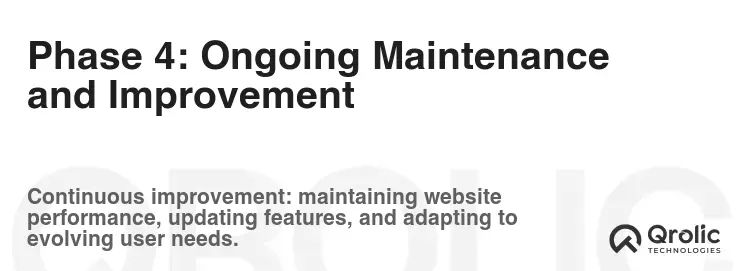
13. Monitoring and Analysis: Staying Ahead of the Game
Continuously monitor and analyze your website’s performance to identify areas for improvement.
- Track Key Metrics: Track key metrics such as website traffic, conversion rates, and customer retention.
- Analyze User Behavior: Analyze user behavior to understand how users are interacting with your website.
- Identify Trends: Identify trends in user behavior and market conditions.
- Use Analytics Tools: Use analytics tools to track and analyze website performance.
14. Updates and Enhancements: Keeping Things Fresh
Regularly update and enhance your website to keep it fresh and engaging for users.
- Add New Features: Add new features and betting options to keep your website competitive.
- Improve User Experience: Continuously improve the user experience based on user feedback and analytics data.
- Keep Up with Technology: Stay up-to-date with the latest technology trends and implement them on your website.
- Address Security Vulnerabilities: Promptly address any security vulnerabilities that are identified.
15. Responsible Gambling: Playing It Safe
Promote responsible gambling and provide resources for users who may be struggling with gambling addiction.
- Implement Responsible Gambling Measures: Implement responsible gambling measures such as deposit limits, self-exclusion options, and age verification.
- Provide Resources: Provide resources for users who may be struggling with gambling addiction, such as links to support organizations and helplines.
- Train Your Staff: Train your staff to identify and assist users who may be exhibiting signs of problem gambling.
Qrolic Technologies: Your Partner in Betting Website Development

Qrolic Technologies (https://qrolic.com/) is a leading provider of software development services, including specialized expertise in building cutting-edge betting websites and platforms. With a proven track record of delivering innovative and scalable solutions, Qrolic Technologies can be your trusted partner in bringing your vision to life.
Why Choose Qrolic Technologies?
- Expertise in Online Gambling: Qrolic Technologies has extensive experience in developing betting platforms, understanding the specific requirements and challenges of the industry.
- Custom Development Capabilities: They offer custom development services, allowing you to create a unique and differentiated betting website tailored to your specific needs.
- Scalable Solutions: Qrolic Technologies builds scalable solutions that can handle a large number of users and transactions, ensuring optimal performance and reliability.
- Security Focus: They prioritize security in all aspects of their development process, implementing robust security measures to protect user data and prevent fraud.
- Dedicated Support: Qrolic Technologies provides dedicated support throughout the development process and beyond, ensuring that you have the assistance you need to succeed.
How Qrolic Technologies Can Help You:
- Platform Development: They can develop a custom betting platform from scratch, incorporating all the features and functionality you need.
- Integration Services: Qrolic Technologies can integrate your platform with various third-party services, such as odds feeds, payment gateways, and CRM systems.
- Mobile App Development: They can develop native mobile apps for iOS and Android, providing your users with a seamless betting experience on their smartphones and tablets.
- UI/UX Design: Qrolic Technologies can create a visually appealing and user-friendly interface for your betting website, optimizing the user experience and driving conversions.
- Ongoing Maintenance and Support: They offer ongoing maintenance and support services to ensure that your platform remains secure, reliable, and up-to-date.
By partnering with Qrolic Technologies, you can leverage their expertise and experience to build a successful and competitive betting website.
Conclusion: Placing Your Bet on Success
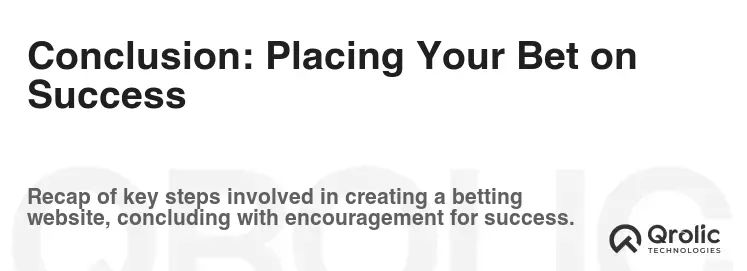
Creating a betting website is a complex and challenging undertaking, but with careful planning, execution, and a strong understanding of the industry, it can also be a rewarding one. Remember to prioritize legal compliance, user experience, security, and marketing. By following this step-by-step guide and continuously monitoring and improving your website, you can increase your chances of success in the competitive world of online sports betting. The key is to build a platform that provides value to your users, fosters trust, and delivers an engaging and entertaining experience. So, are you ready to place your bet on success?
